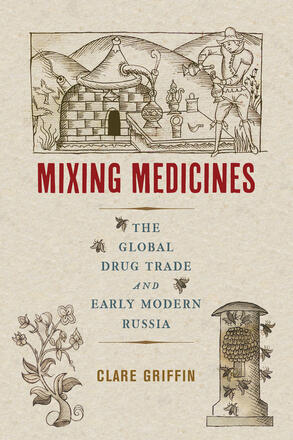
Mixing Medicines
The Global Drug Trade and Early Modern Russia
What the medicines of early modern Russia can tell us about scientific knowledge, global trade networks, and the long reach of colonialism.
Description
Early modern Russians preferred one method of treating the sick above all others: prescribing drugs. The Moscow court sourced pharmaceuticals from Asia, Africa, Western Europe, and the Americas, in addition to its own sprawling empire, to heal its ailing tsars.
Mixing Medicines explores the dynamic and complex world of early modern Russian medical drugs, from its enthusiasm for newly imported American botanicals to its disgust at Western European medicines made from human corpses. Clare Griffin draws from detailed apothecary records to shed light on the early modern Russian Empire’s role in the global trade in medical drugs. Chapters follow the trade and use of medical ingredients through networks that linked Moscow to Western Europe, Asia, and the Americas; the transformation of natural objects, such as botanicals and chemicals, into medicines; the documentation and translation of medical knowledge; and Western European influence on Russian medical practices. Looking beyond practitioners, texts, and ideas to consider how materials of medicine were used by one of the early modern world’s major empires provides a novel account of the global history of early modern medicine.
Mixing Medicines offers unique insight into how the dramatic reshaping of global trade touched the day-to-day lives of the people living in early modern Russia.
Reviews
“This fascinating book, by virtue of its focus on early modern Russia, represents an important and significant contribution to the scholarship on globalization and the history of medicine, drugs, and materia medica in the early modern world.” Matthew Crawford, Kent State University and co-editor of Drugs on the Page: Pharmacopoeias and Healing Knowledge in the Early Modern Atlantic World